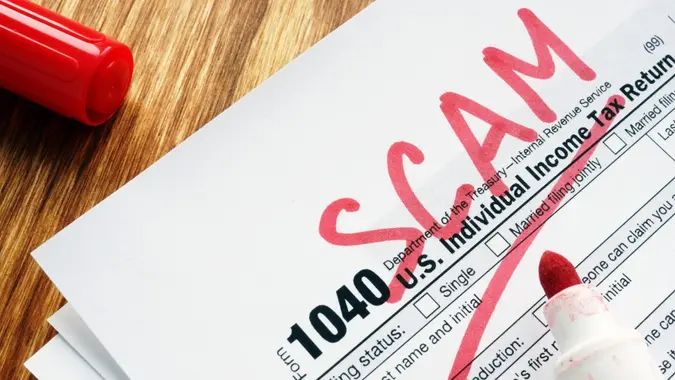Watch Out for These 6 Dirty and Dangerous Tax Scams the IRS Revealed

Commitment to Our Readers
GOBankingRates' editorial team is committed to bringing you unbiased reviews and information. We use data-driven methodologies to evaluate financial products and services - our reviews and ratings are not influenced by advertisers. You can read more about our editorial guidelines and our products and services review methodology.

20 Years
Helping You Live Richer

Reviewed
by Experts

Trusted by
Millions of Readers
The Internal Revenue Service (IRS) opened the 2025 tax season on Jan. 27, which not only means that thousands of people began filing their tax returns, but also means that scammers are actively searching for victims.
Here are some of the most common tax scams identified by the IRS for 2025 and tips on how taxpayers can protect themselves.
Phishing and Smishing
Phishing (email) and smishing (text) scams are a popular avenue for criminals to locate unwitting victims. They pose as legitimate financial or tax organizations, including the IRS or tax software companies, via unsolicited texts or emails to lure victims into giving their personal or financial information.
A common phishing scam is an email posing as the IRS offering the recipient a phony tax refund or threatening them with false criminal charges for tax fraud.
Smishing scams often include a text to the victim with a call to action such as, “Your account is on hold” and includes a link to “restore” the account.
The IRS states never to click on any unsolicited communication you receive from the IRS. Doing so may load malware or ransomware onto your device.
Harmful Social Media Advice
Believing everything you see or hear on social media is dangerous — including if it has to do with filing taxes. According to the IRS, in 2025, inaccurate or misleading tax advice is running rampant on social media, which can lead to issues like tax problems and identity theft.
The only social media advice taxpayers should pay attention to is from trusted sources, such as the IRS or legitimate tax professionals.
IRS Online Account ‘Help’ From Scammers
Those with criminal intent pose as a third party offering to help create your IRS Individual Online Accounts at IRS.gov. The IRS states that taxpayers do not need assistance to complete this process.
However, scammers take this approach in hopes of stealing an unaware taxpayer’s information, so they can submit a fake tax return in the victim’s name and claim a refund.
Fake Self-Employment Tax Credit
Unfortunately, tax scams related to COVID-19 are still in play in 2025. Fraudsters take to social media to mislead taxpayers into filing false claims for a “self-employment tax credit,” which they say can result in a tax credit and payments of up to $32,000 for qualifying events during the COVID-19 pandemic.
Unfortunately, the credit is not called the self-employment tax credit, it’s called “Credits for Sick Leave and Family Leave,” and qualifying for it is not as easy as scammers make it seem. In fact, the IRS is looking very closely at any claims of this nature to ensure that the taxpayers actually qualify for the credits they’re claiming.
Overstated Withholding Scam
Another recent scam involves fraudsters on social media who encourage people to fill out specific IRS forms, such as Form W-2, Form 1099-WEC and other 1099 forms, with large false amounts of withholding and income information. Next, they encourage them to file a fraudulent tax return electronically in hopes of getting a substantial and undeserved refund.
In the event that the IRS cannot verify the information on one of these forms, including wages, income or withholding credits, the tax return will be held for further review and unravel the scam.
‘Ghost’ Tax Preparers
Unfortunately, there are scammers posing as professional tax preparers. According to the IRS, common warning signs include fees that are based on the size of the expected refund and a tax preparer who is not willing to sign the return or include their IRS Preparer Tax Identification Number as the law dictates.
The IRS urges taxpayers to avoid signing a tax return that’s blank or incomplete and to always work with a trusted tax professional who can be verified.
 Written by
Written by  Edited by
Edited by 

























